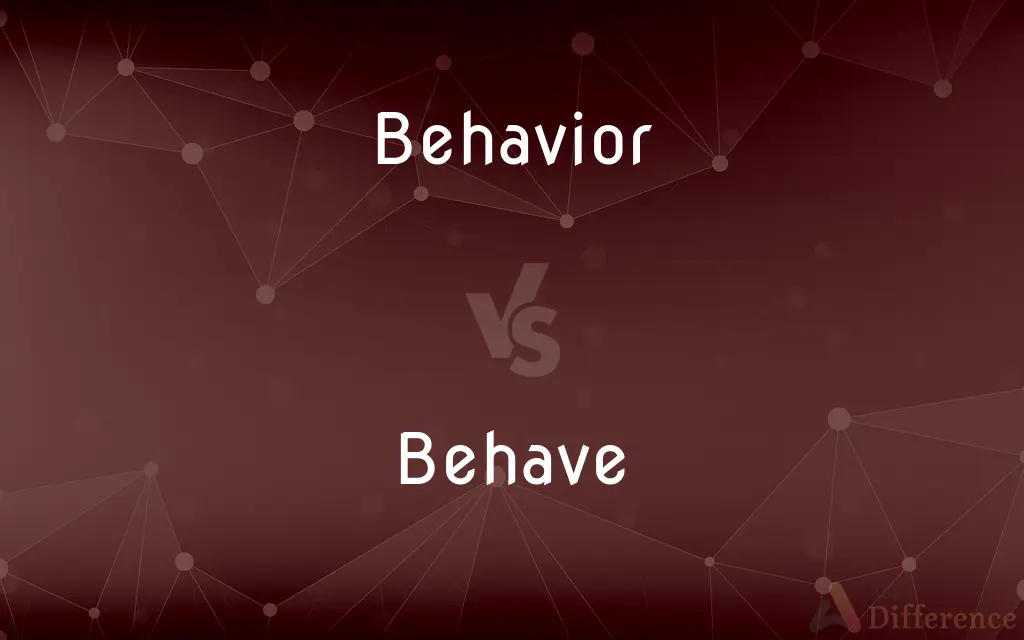Behavior vs. Behave — What's the Difference?
By Tayyaba Rehman & Urooj Arif — Updated on March 26, 2024
Behavior refers to actions and responses of an individual or group, while behave describes the act of conducting oneself in a specific manner.

Difference Between Behavior and Behave
Table of Contents
ADVERTISEMENT
Key Differences
Behavior encompasses the wide range of actions and reactions exhibited by entities, typically observed within a specific context. Behave, on the other hand, is a verb that refers to the act of conducting oneself in a particular way.
While behavior is a general term that can describe any observable action, ranging from physical movements to complex emotional responses, behave is more focused and often carries implications of appropriateness or compliance with social norms or expectations. For instance, discussions on behavior can be broad, analyzing patterns and motivations, whereas to behave is directly related to how those patterns are enacted in real-time situations.
In educational or developmental contexts, behavior is analyzed as part of understanding growth, psychological states, and learning processes. It's a subject of study aimed at identifying patterns, causes, and effects. Behave, however, is often used in these same contexts with a prescriptive tone, focusing on guiding or modifying actions to fit within desired parameters.
Behavior can be classified into various types, such as social behavior, learning behavior, and abnormal behavior, each with distinct causes and manifestations. This classification helps in the understanding and treatment of various conditions or in enhancing learning and social interactions. Behave, being action-oriented, is typically discussed in terms of immediate actions or reactions, such as how to behave in public, during emergencies, or in social interactions, emphasizing the conduct aspect.
Comparison Chart
Part of Speech
Noun
Verb
ADVERTISEMENT
Definition
Actions and reactions of individuals or groups
The act of conducting oneself in a manner
Focus
Observable actions
Process of acting or reacting
Implications
Broad, can be instinctive or learned
Often implies appropriateness or compliance
Context
General, across various situations
Specific situations or expectations
Study
Analyzed in psychology and sociology
Discussed in terms of directives or guidance
Compare with Definitions
Behavior
Observable Actions and Reactions.
The behavior of wolves in the wild varies greatly.
Behave
Comply with Social Norms or Expectations.
The children learned to behave in public.
Behavior
Manner of Conducting Oneself.
Professional behavior is expected at all corporate events.
Behave
Act or Conduct Oneself in a Specific Way.
She behaved impeccably at the ceremony.
Behavior
Conduct of a Machine or System.
The erratic behavior of the software indicates a bug.
Behave
Demonstrate a Particular Characteristic.
Certain chemicals behave unpredictably when mixed.
Behavior
Manner of Acting in Different Situations.
His behavior at the party was commendable.
Behave
React in a Specified Manner.
He behaved nervously during the interview.
Behavior
Response to Environmental Stimuli.
Plant behavior in response to sunlight is fascinating.
Behave
Function or Operate in a Particular Manner.
The material behaves differently under pressure.
Behavior
Behavior (American English) or behaviour (British English; see spelling differences) is the actions and mannerisms made by individuals, organisms, systems or artificial entities in conjunction with themselves or their environment, which includes the other systems or organisms around as well as the (inanimate) physical environment. It is the computed response of the system or organism to various stimuli or inputs, whether internal or external, conscious or subconscious, overt or covert, and voluntary or involuntary.Taking a behavior informatics perspective, a behavior consists of actor, operation, interactions, and their properties.
Behave
To conduct oneself or act in a specified way
One of the guests behaved badly at the party. Our old dog sometimes behaves like a puppy.
Behavior
The manner in which one acts or behaves.
Behave
To conduct oneself or act in a proper way
I told the child to behave.
Behavior
The actions or reactions of a person or animal in response to external or internal stimuli.
Behave
To act, react, function, or perform in a particular way
This fabric behaves well even in hot weather.
Behavior
The manner in which something functions or operates
The faulty behavior of a computer program.
The behavior of dying stars.
Behave
To conduct (oneself) properly
Did you behave yourself at the party?.
Behavior
(uncountable) Human conduct relative to social norms.
Behave
To conduct (oneself) in a specified way
The witness behaved herself with great calmness.
Behavior
(uncountable) The way a living creature behaves or acts generally.
Behave
(reflexive) To conduct (oneself) well, or in a given way.
You need to behave yourself, young lady.
Behavior
A state of probation about one's conduct.
He was on his best behavior when her family visited.
Behave
(intransitive) To act, conduct oneself in a specific manner; used with an adverbial of manner.
He behaves like a child whenever she's around.
How did the students behave while I was gone?
My laptop has been behaving erratically ever since you borrowed it.
Behavior
(countable) An instance of the way a living creature behaves.
Behave
To conduct, manage, regulate (something).
Behavior
Observable response produced by an organism.
Behave
(intransitive) To act in a polite or proper way.
His mother threatened to spank him if he didn't behave.
Behavior
(uncountable) The way a device or system operates.
Behave
To manage or govern in point of behavior; to discipline; to handle; to restrain.
He did behave his anger ere 't was spent.
Behavior
Manner of behaving, whether good or bad; mode of conducting one's self; conduct; deportment; carriage; - used also of inanimate objects; as, the behavior of a ship in a storm; the behavior of the magnetic needle.
A gentleman that is very singular in his behavior.
Behave
To carry; to conduct; to comport; to manage; to bear; - used reflexively.
Those that behaved themselves manfully.
Behavior
Manner of acting or conducting yourself
Behave
To act; to conduct; to bear or carry one's self; as, to behave well or ill.
Behavior
The action or reaction of something (as a machine or substance) under specified circumstances;
The behavior of small particles can be studied in experiments
Behave
Behave in a certain manner;
She carried herself well
He bore himself with dignity
They conducted themselves well during these difficult times
Behavior
(behavioral attributes) the way a person behaves toward other people
Behave
Behave well or properly;
The children must learn to behave
Behavior
(psychology) the aggregate of the responses or reactions or movements made by an organism in any situation
Common Curiosities
What influences behavior?
Behavior can be influenced by a variety of factors, including genetics, environment, social norms, and personal experiences.
Can behavior be changed?
Yes, behavior can be modified through learning, therapy, and changes in the environment or personal experiences.
Why is it important to behave appropriately?
Appropriate behavior ensures smooth social interactions, adherence to societal norms, and can influence personal and professional outcomes.
Can animals behave?
Yes, animals behave in ways that are instinctive, learned, or a combination of both, often studied in ethology and psychology.
How are behavior and mental health related?
Behavior is a key indicator of an individual's mental health, with changes in behavior often signaling psychological conditions.
What is social behavior?
Social behavior refers to how individuals interact with each other within a society, encompassing cooperation, conflict, and communication.
Is behaving well the same as having good manners?
Behaving well often includes having good manners, but it also encompasses broader concepts of ethics and appropriateness in various contexts.
What is behavior?
Behavior refers to the range of actions and mannerisms made by individuals, organisms, systems, or artificial entities.
How does someone behave?
To behave means to act or conduct oneself in a particular way, often in response to a specific situation or set of expectations.
What role do parents play in a child's behavior?
Parents significantly influence their child's behavior through modeling, reinforcement, and setting boundaries.
Can machines exhibit behavior?
Yes, machines and software can exhibit behavior in how they operate, respond to inputs, and perform their functions.
How can behavior be studied?
Behavior can be studied through observation, experiments, and psychological assessments to understand underlying patterns and causes.
What is the difference between behavior and behave?
Behavior is a broad term for actions and reactions, whereas behave focuses on the act of conducting oneself in a specific way.
What is abnormal behavior?
Abnormal behavior deviates from the norm and can indicate psychological disorders or distress.
How does culture influence behavior?
Culture shapes behavior by setting expectations, norms, and values that guide how individuals act within a society.
Share Your Discovery

Previous Comparison
Postlapsarian vs. Prelapsarian
Next Comparison
Uncompliant vs. IncompliantAuthor Spotlight
Written by
Tayyaba RehmanTayyaba Rehman is a distinguished writer, currently serving as a primary contributor to askdifference.com. As a researcher in semantics and etymology, Tayyaba's passion for the complexity of languages and their distinctions has found a perfect home on the platform. Tayyaba delves into the intricacies of language, distinguishing between commonly confused words and phrases, thereby providing clarity for readers worldwide.
Co-written by
Urooj ArifUrooj is a skilled content writer at Ask Difference, known for her exceptional ability to simplify complex topics into engaging and informative content. With a passion for research and a flair for clear, concise writing, she consistently delivers articles that resonate with our diverse audience.














































